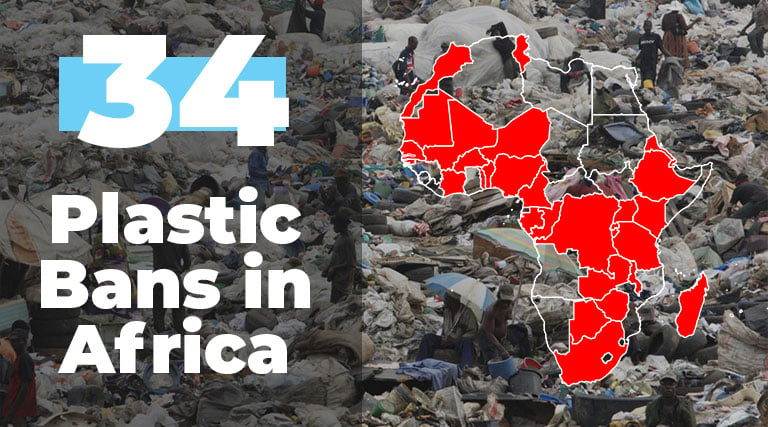
Africa has come a long way on the journey to creating a single-use plastic-free world with many victorious milestones to celebrate across the continent. We’ve been said to be leading the way in the fight against single-use plastic. But our steps are heavy as we move forward, with the world under lockdown and the many pressures of a pandemic on our shoulders. Every journey has interruptions, obstacles, and reflective pauses; COVID-19 certainly feels like a combination of all of these. So, while we reconfigure our compasses, let’s take stock of where we are.
Out of 54 states, 34 have either passed a law banning plastics and implemented it or have passed a law with the intention of implementation. Of those, 16 have totally banned plastic bags or have done so partially without yet introducing regulations to enforce the bans. Compared to the rest of the world, the continent is seemingly doing a great job, but let’s look at the reality of plastic bans in Africa.
1. Eritrea
In 2005, the East African state became the first to adopt an outright ban on plastic bags.
2. Benin
The West African country adopted a ban on the production, importation, marketing, possession and use of non-biodegradable plastic bags in November 2017 in an effort to end marine plastic pollution.
3. Tanzania
Plastic sachets used for packing distilled and other alcoholic beverages are prohibited from being manufactured or imported to mainland Tanzania. Tourists are not allowed to enter the country with plastic carrier bags.
4. Uganda
Despite the measures put in place to ban plastic bags in 2007, the government of Uganda has struggled to implement it because of lack of regulation.
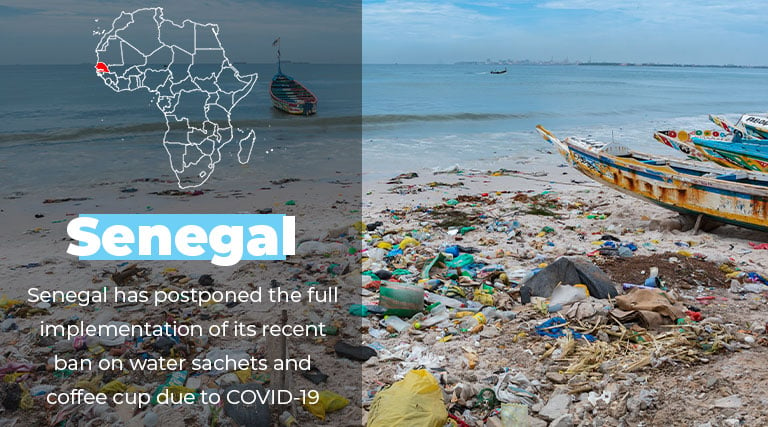
5. Senegal
Senegal is the most recent country to tighten its efforts against single-use plastic. It announced its ban on single-use plastic water sachets and coffee cups in February 2020, to be implemented in April 2020. Senegal’s ban intersects with other issues including water security and the COVID-19 pandemic. It includes, but still makes an allowance for, the water sachets that many people rely on for access to clean water. This will change after the pandemic ends, but certainly raises some questions.
After the pandemic, what measures will the Senegalese government take to effectively implement the ban while still ensuring that people can access clean water? This may be a moment where the government takes the opportunity to innovate a solution that protects public and environmental health simultaneously. With a little imagination and political will, it’s definitely possible.
6. Côte d’Ivoire
The ban on non-biodegradable plastic bags that was expected to come into effect in November 2013 was met with fierce opposition from the plastics industry. The law includes plastics used for bags of drinking water. In 2016, they also outlawed plastic sachets used for alcohol.
7. Madagascar
Plastic bags less than 0.05 millimeters thick have been banned in Madagascar since 2015, and have forced local businesses to find alternative packaging solutions.
8. Nigeria
West Africa’s economic hub announced a ban on plastic bags in 2013, which came into effect in 2014. It includes both plastic shopping bags and plastic sachets of drinking water. Last year, it strengthened its legislation by including a fine of N500 000 or 3-year jail term for any store found giving plastic bags to customers.
9. Mali
A ban against non-biodegradable bags was announced in 2013.
10. Tunisia
The plastic bag ban in Tunisia is part of a broader effort at establishing greener policy. It came into effect in March 2017, and requires all supermarket chains to stop distributing the bags.
11. Malawi
Plastic bags were first banned in Malawi in 2015, but the country’s high court overturned the original ban the next year after 14 plastic manufacturers opposed the ban, saying it was “an infringement of business rights.” But last year, seven supreme court judges ruled that the original ban must be upheld after all.
12. Mauritania
In 2013, Mauritania banned plastic bags. In the capital of Mauritania, an estimated 70 percent of cattle and sheep deaths are caused by plastic bag ingestion.
13. The Gambia
Under the prohibition and ban of the use of plastic bags in The Gambia: a person who manufactures or imports, uses or sells plastic bags commits a criminal offence.
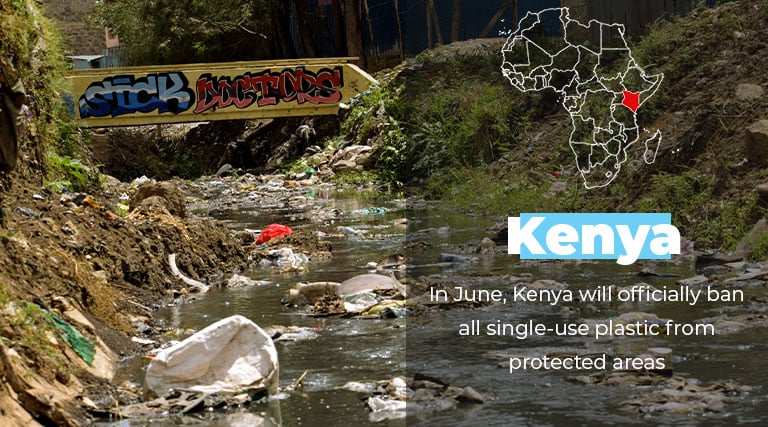
14. Kenya
Kenya leads the way with the strictest ban on single-use plastic in the world. And it’s clear how this title was earned: importing, manufacturing or selling single-use plastic bags could earn companies a fine of $40 000; using one, on the other hand, could see individuals slapped with a $500 fine. Despite the fact that plastic bags are still smuggled into Kenya, the ban has been considered successful by many. In June 2019, Kenya’s president announced a ban on the use of single-use plastics in protected areas which will take effect in June this year, but regulations have yet to be established.
15. Rwanda
Rwanda is a shining star on the continent, instituting in 2008 a national ban on non-biodegradable plastic bags. The ban prohibited the manufacture, use, importation and sale of plastic carrier bags. Travelers into Rwanda face similar restrictions to those headed for Tanzania, and are not allowed to bring plastic carrier bags into the country. Rwanda also introduced ‘Umuganda’, a community cleanup held on the last Saturday of every month. It is one of the reasons Rwanda is renowned for its cleanliness, especially the capital city of Kigali. In October 2019, Rwanda became the first country in Africa to issue a complete ban on all single-use plastics.
But there is still work to be done. Rwanda, despite their successes, shares Kenya’s smuggling problem, and it seems that implementation is a shared problem across the continent, with enough local nuance to make anybody scratch their heads.
16. Mauritius
The law was promulgated in August 2015, and strictly prohibits import, manufacturing, sale or supply of plastic bags. However, in 2016, the Mauritian government exempted a list of plastic bags from the ban. Which means that plastic bans are not entirely banned in this country.
17. Democratic Republic of the Congo
Plastic pollution in the DRC has been linked to flood-related deaths in the past. The cause? Rivers and sewage systems blocked by plastic rubbish – a completely avoidable consequence. The government banned the manufacture and sale of plastic bags and bottles, but implementation remains a challenge.
18. Congo-Brazzaville
Plastic bags and sachets for the sale of food, water and any other drink are prohibited, along with oxo-biodegradable plastic bags, sachets and films.
19. Seychelles
Only the manufacturing, importation, distribution of plastic bags, which do not fall into the list of exempted plastic, is permitted. This ban focuses mainly on thin plastics.
20. Burkina Faso
The law prohibits the production, import, marketing and distribution of packaging and non-biodegradable plastic bags in Burkina Faso.
21. Botswana
In 2007, Botswana established a minimum thickness for bags and mandated that retailers apply a minimum levy to thicker bags, which would be used to support government environmental projects. Many retailers charged more than the minimum tax, and prices fluctuated over time. A study of four retail chains 18 months after implementation of the charge showed that bag use fell by half – imagine what it would be like with a total ban!
22. Zambia
In 2018, the Zambian government banned the use of packaging materials such as plastic bags and their resultant waste. However, here too, there are no existing regulations on the implementation of this ban.
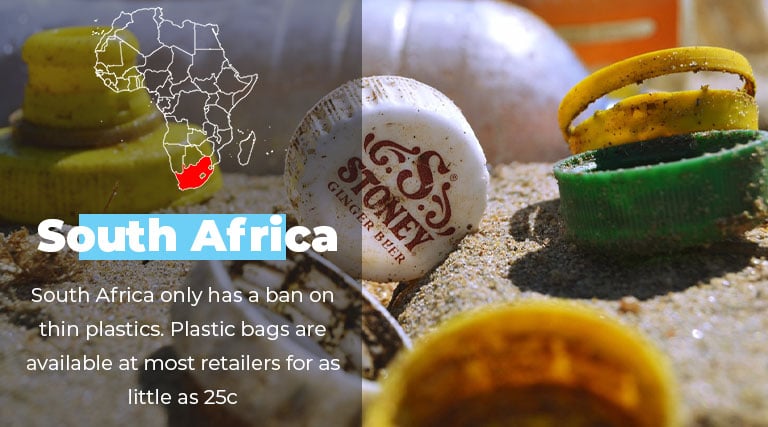
23. South Africa
The national elections in 2019 provided Greenpeace Africa with an opportunity to engage politicians on the issue of plastic pollution. Our volunteers rallied together to create a successful petition that was delivered to representatives of each major political party in the country, calling for the inclusion of a ban on single-use plastics in their election manifestos.
South Africans are familiar with the levy on plastic bags, and it is an easy enough measure for the government to implement – which it has since the levy was introduced in 2004, along with a ban on thin plastic bags. However, the April floods in Durban last year forced us to question the efficacy of this levy. When the Durban harbour seemed to have more plastic than water after the floods, who does it comfort to know that we pay 25 cents for a bag when we buy groceries?
24. Gabon
Prohibition of the import and marketing of non-recyclable plastic bags – which doesn’t help much considering that only 9% of all plastic ever gets recycled.
25. Ethiopia
Ethiopia is yet another country looking for eco-friendly status with their plastic ban. In 2008, it passed a law only banning thin plastic bags.
26. Cameroon
Cameroon’s government placed a ban on non-biodegradable plastics in 2014; the ban covers the importation, production and sale of single-use plastic items, and followed a ministerial calculation that Cameroon dumped more than six million tonnes of plastic waste annually. Cameroon has struggled to implement the ban, facing numerous obstacles in terms of plastic waste management systems and infrastructure. Despite this, the Cameroonian government has reiterated its willingness to work with key players to come up with innovative solutions.
27. Djibouti
Importation and marketing of non-biodegradable plastic bags and packaging, not manufactured in the country, have been strictly prohibited since 2016.
28. Morocco
Moroccan consumption of the raw material used in manufacturing plastic bags dropped by 50 percent since its plastic bag ban came into effect in 2015. Last year, the government introduced amendments to the law, allowing for the seizure of plastic used to legally make bags.
29. Niger
Niger has only gone as far as to ban the storage of low-density plastic bags and flexible packaging. It joins the list of countries whose governments are fronting as warriors in the fight against plastic pollution.
30. Togo
Togo has banned the manufacturing, importation, distribution and marketing of non-biodegradable bags and packaging.
31. Zimbabwe
Apart from plastic bags used for bread, the manufacture for use, commercial distribution or importation of plastic packaging with a wall thickness less than 30 micrometers is prohibited, biodegradable or not. Also, no ink shall be used for printing on plastic and plastic bottles unless the ink and the printing comply with compulsory specifications.
32. Cabo Verde
The island nation has prohibited the production, import into the market, and use of conventional plastic bags for packaging.
33. Burundi
Burundi criminalised the use and possession of plastic bags last year, and has set a 2020 target to enforce a total ban on single-use plastics.
34. Guinea-Bissau
In 2013, the government announced a ban on plastic bags that came into effect in 2014.
External References – Deutsche Welle, The Independent, All Africa, Earth Policy Institute, UN Environment
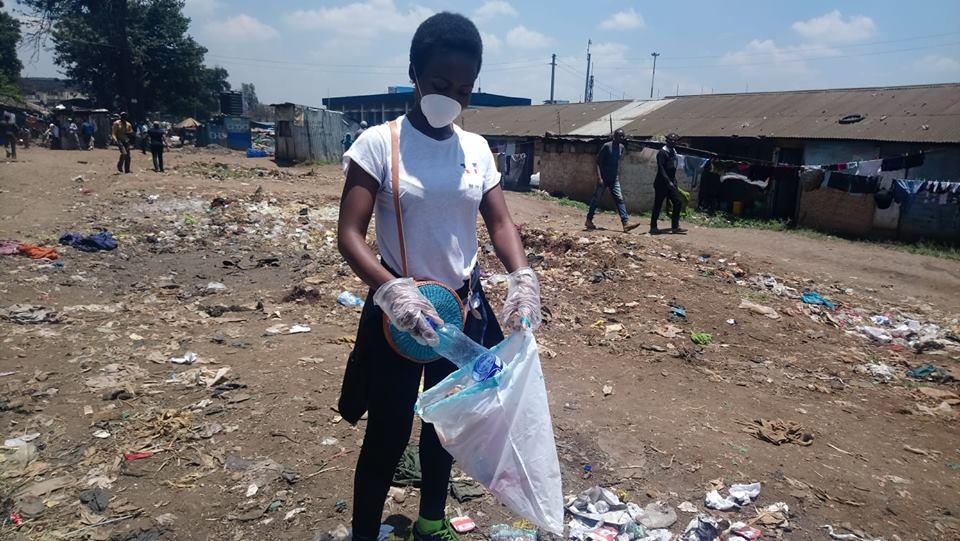 Get Involved
Get Involved

Discussion
Congo Rainforest is the second largest forest on the world. Please stop Deforestation on Congo Rainforest and it's a time to protect our forests. We stand to defend our future.
Thank you for your support.
It's a great step taken by African countries to implement initiatives to enforce plastic ban, but much more has to be done to eradicate the plastic pollution in our communities
Thanks once again, for all the work you guys do! The plastic situation is a huge problem, and its astounding, if not mindboggling that more and more gets manufactured. Why is it allowed? Not only carry bags, but other plastics too. I realize not all are bad, but for those that are, can you (Greenpeace) start a petition to government to completely ban plastic carry bags (perhaps some other evils too in the world of plastics)? I'd love to hear your thoughts on this. Bless you all. Leigh
We totally agree with this, we have a plastic ban petition. Please click on the link >>> https://act.greenpeace.org/page/66681/action/1
Ban plastics!
A person that does not litter performs an unselfish act. Cleaning up without pay is healing the world. That person also creates a higher consciousness of what it means to be a responsible citizen of the world. We can no longer live as parasites and expect mother earth to provide. Clean communities are more successful than littered ones: fact.
https://www.planetwood.co.uk/blog/the-true-impact-of-plastic-bags-compared-to-paper-and-reusable-bags From a single-use viewpoint, surprisingly, plastic bags seem to have the least overall environmental impact. Which doesn't solve the problem. Seems to me the only solution is a total ban on ALL packets at the supermarket till. It's easy enough to bring your own carrier bags, and cheaper. Another point: People won't re-use their bags, they are too lazy or un-motivated or it's considered degrading, the friends they see at the mall might think they are poor. Supermarkets should perhaps charge a lot more for their bags, but then give a discount to those supplying their own.
👍
Le plastique est l'un des préoccupations sur la question du climat en Afrique. Aujourd'hui beaucoup de Plastiques sont utilisés ET abandonnés dans la nature, ET d'autres brûlés à l'air libre . Malheureusement face à cette situation, nos dirigeants africains instaurent des lois sur l'interdiction de vente du plastique , mais ces lois sont restés au point mort.
Merci de partager avec nous. En effet, nos dirigeants africains doivent faire passer l'environnement et ses habitants avant les profits.
Plastic bags and bottles are one of the major causes of flooding in Nigeria, as they block drainages. They are also washed to the streets and roads whenever it rains, making the environment unappealing. I have embarked on a project to produce fabric shopping bags to replace single-use plastic bags but if the law to ban or regulate the use of plastic bags has not been enacted, it would be difficult to get many Nigerians to embrace it.
I must admit I just did not know how many movements and administrative steps have already been taken in all these African countries to get away from these polution and health threats. Only if we take steps from every possible angle around the world, we will be able to reduce what harms our environment so greatly. We are in this together.
Plastic pollution is indeed a global pandemic, and working together we can eliminate it by going green.
After not visiting Cape Verde for couple years in a row then coming back to see that the info stated on #32 does not correspond to the current reality, on the main island of the archipelago. In all supermarkets and markets free plastic bags are freely available for customers, the usage of plastic straw is still flowing as usual. Cape Verde, an archipelago, surrounded by the precious sea, such a small country and has been doing very little - only official statements, from the Ministry of Agriculture and Environment, towards turtles protection and renewable energies; all good things, though, still, far way far from enough - in terms of contributions to our planet. No civil / educational advertisement, regarding the plastic usage impacting the environment severely, to spare the archipelago and planet is seen nor heard of. By now the entire archipelago should have banned the plastic bag and straw usage. It can be possible. Please, Greenpeace, regulate and double-check these informations, for this present situation, reported here, is roundly unacceptable, taking that so many countries are now contributing for a better planet, including some of those with low financial resources, and for our well-being, is also our duty to do more, way more; no excuses on the contrary must be tolerated for a common good. Gratitude for all your services and improvements.
Thank you for your comment. We totally agree 💯 about banning of single-use plastic packaging. Single-use plastic manufacturers must switch to green alternative packaging. Please start a campaign on our broader platform called VUMA.EARTH, please click on the link to get started >>>VUMA.EARTH
Congratulations to these countries. There should be a World prize for the country who reduces plastic use the most. They put other so-called first world countries to shame.
Thank you for your support, totally agree 💯. We need to ban single-use plastic products and switch to green alternative packaging.
Good day to you. Welldone for the good work you're doing. The reality in the country called NIGERIA is that most of the population are not even aware of the imminent dangers in single use plastic, neither is there any strong opposition to its wanton use and/or careless disposal. It's freely handed out without restrictions for almost anything you buy. When I buy stuff and I refuse to take the freely offered plastic bags or I look for other options, everyone tends to strangely look at me like... When i try to educate people about it, most of them look like they're hearing about it for the first time and some take it lightly. It's so disheartening. There's a huge danger ahead and nobody seems to care.
Thank you for sharing with us. Truly disheartening indeed, unfortunately, as consumers, plastic is forced on us; hence we need the African government to implement a permanent ban on single-use plastic packaging.
Nigeria does not have a ban on plastic bags. Been working here since 2014, bags are still widely used at every grocy store and also still used for water.
Thank you for sharing with us; this is truly unacceptable. Our African governments and single-use plastic producers must switch to sustainable packaging methods.
Oxo-degradable bags are all over the places, here in Cape Verde. Stacked on shelves in shopping store ready for purchase in rolls of hundreds and handed out without charges every store you can call a store (or as the locals say:lodjas) Nothing has changed since the implementation of the 2017 Act dated 18 of January. Cape Verde government is simply hiding the truth, at all costs and resources. In fact the only change since the aforementioned Act is that the local communities have been told and assumed that OXO-Degradable bags are good for the environment, they will dissolve in no time, and therefore Cape Verdean should continue using them without worries. Everything but the correct information are going around here, people are mis-led into this, whether with wrong misleading information on the bags - now printed with the map of the archipelago and a catchy phrase that says - ‘protege kel ke di nos’ which in Krioulo means - protecting what belongs to us. Athena government and anyone behind this plastic bags scam is taking deliberately advantage of limited access to internet and other information channels, leading to massive lack of clarity and transparency, perhaps just wishing to finish the stock, perhaps just weighing in trade opportunities against environmental protection, and one more time inevitably leaning towards hiding TRUTHFUL information to local and foreign consumers. An easy way out for them, and possibly another decade of micro plastic around this region too. Please get in touch if you need more information. Kind regards, Antonella Sustainable Cape Verde A phrase that says - protege kel ke di nos (protect what is yours)
Thank you for sharing with us. This is truly disheartening 😔; kindly take action here>>>> https://act.gp/3wmbamE
I was here to check the list of African nations where plastic bags have been fully or partially banned. To the best of my knowledge, Nigeria has not banned the use of plastic bags and neither is there any jail term or fine to be paid by offenders.
Thank you for your comment. Unfortunately, most African countries have not permanently banned single-use plastic products and packaging.